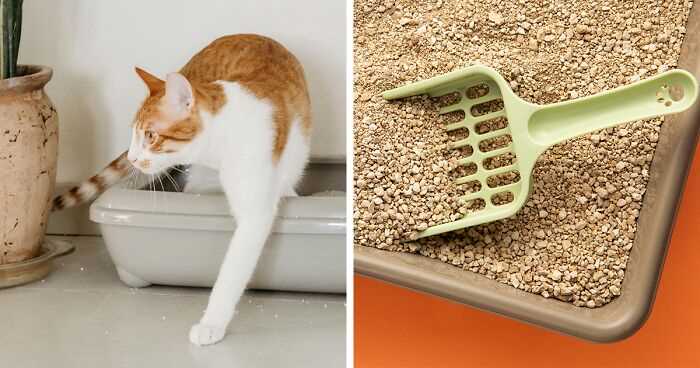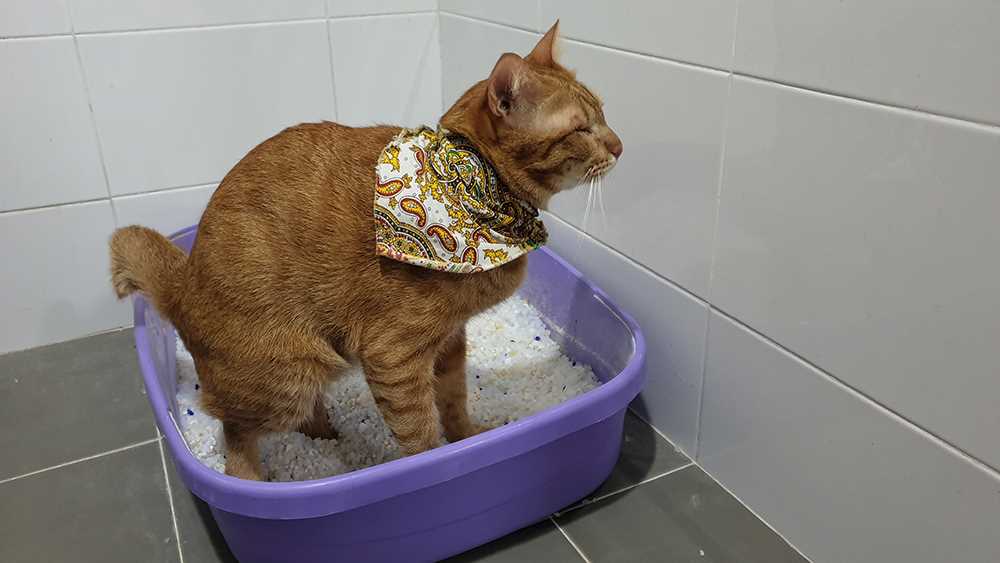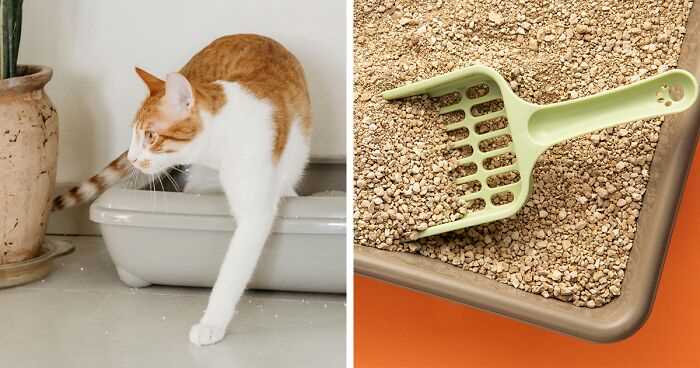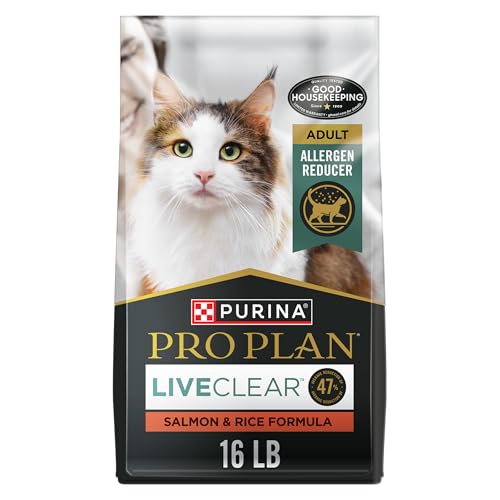



Use clumping litter with added odor control. This type of litter absorbs moisture and forms solid clumps, making cleanup easier while minimizing unpleasant scents. Look for products that contain baking soda or activated charcoal, as these ingredients effectively neutralize odors.
Regularly clean the litter box. Scoop out waste daily to prevent buildup. Wash the box with mild soap and warm water at least once a week to eliminate lingering smells. Rinse thoroughly and let it dry completely before adding fresh litter.
Consider adding a layer of baking soda beneath the litter. This simple trick helps absorb moisture and odors, enhancing the overall freshness of the box. Just a thin layer can make a noticeable difference.
Place the litter box in a well-ventilated area. Proper airflow helps disperse any unpleasant odors. Avoid enclosed spaces, as they can trap smells and make them more intense.
Use air purifiers or odor eliminators to create a fresher environment. These devices can help filter out odors and improve air quality. Natural options, like essential oil diffusers with pet-safe oils, can also provide a pleasant scent.
Incorporate dietary adjustments. High-quality food can lead to less pungent waste. Consult with a veterinarian about the best diet for your furry friend to help reduce unwanted odors.
Finally, ensure your human is attentive to your needs. A happy kitty often has less smelly surprises, so regular playtime and affection can contribute to overall well-being and less odor.
Choosing the Right Cat Litter for Odor Control
The best option for minimizing unpleasant odors is clumping litter. This type absorbs moisture and forms solid clumps, making it easier to scoop out waste quickly. Look for clumping litters made from natural materials, such as corn or wheat, which often have better odor-absorbing qualities than traditional clay litters.
Consider Scented Options
Scented litter can mask unwanted odors effectively. However, not all scents are suitable for every feline. Test different fragrances to find one that works for you without causing irritation. Some cats prefer unscented options, so watch for any changes in behavior.
Evaluate Maintenance Needs
High-quality litters require less frequent changing, which helps control smells longer. Brands that boast advanced odor control technology can significantly reduce the frequency of litter box cleanings. Invest in a litter that suits your lifestyle, making maintenance straightforward while keeping your space fresh.
For those who also have dogs, consider reading about how to train a dog with an invisible fence for additional pet care tips.
Regular Cleaning Routines to Minimize Odors
Daily scooping is non-negotiable. Removing waste at least once a day helps prevent lingering scents. I make sure my human knows this is a top priority. If they miss a day, the odor builds up quickly.
Weekly deep cleans are also crucial. This involves emptying the entire litter box, washing it with mild soap and water, and replacing the litter completely. A fresh start keeps everything smelling nice. I suggest using a sprinkle of baking soda at the bottom of the box before adding new litter; it absorbs odors effectively.
Spot Cleaning Techniques

Spot cleaning is another smart strategy. If I notice a particularly pungent area in the box, addressing it right away prevents it from spreading. Keeping a small scoop handy makes this easy and efficient.
Maintaining Litter Box Location
Location matters! Placing the litter box in a well-ventilated area can significantly reduce unwanted scents. Avoid tight spaces without airflow, as they trap odors. My box is near an open window, which helps keep things fresh.
Finally, consideration of multiple boxes is wise if there are multiple furry friends in the household. This reduces the chance of any single box becoming overwhelmed with waste, leading to unpleasant aromas. It’s about creating a pleasant environment for everyone!
Using Baking Soda and Other Natural Deodorizers
Baking soda is a fantastic option for neutralizing unpleasant odors. Simply sprinkle a layer over the litter before adding the usual amount, or mix it directly into the litter box. This helps absorb moisture and combat any lingering scents.
Activated Charcoal
Activated charcoal is another natural deodorizer that works wonders. Placing a small pouch or bowl of activated charcoal near the litter box can significantly reduce foul odors. It captures and eliminates unwanted smells effectively.
Essential Oils Caution
While essential oils can be refreshing, be cautious with them around felines. Some oils are toxic. If you want to use them, ensure they are safe for pets and always dilute them properly. A few drops of lavender or chamomile in a diffuser can create a pleasant environment without harming me!
For additional tips on keeping your space fresh and pest-free, check out the best natural flea treatment for cats.
Maintaining a Healthy Diet for Your Feline Friend
High-quality protein sources like chicken, turkey, and fish are key for my meals. I thrive on a diet rich in animal-based proteins, which keeps my coat shiny and energy levels high. Look for food with meat listed as the first ingredient; it’s a good indicator of quality.
Hydration is Key
Always have fresh water available. I prefer running water, so a pet water fountain might be a hit. It encourages me to drink more, which aids digestion and overall health.
Watch Out for Fillers
Avoid foods with excessive fillers like corn and soy. They don’t provide the nutrients I need and can lead to digestive issues. Opt for grain-free options or those with wholesome grains in moderation.
Implementing Air Fresheners and Odor Neutralizers
Using air fresheners and odor neutralizers can significantly enhance the environment for both humans and pets. Here are some effective options to consider:
Types of Air Fresheners
- Sprays: Quick and easy to use, sprays can immediately freshen up a room. Look for those specifically designed for pet odors.
- Plug-ins: Continuous scent release from plug-in devices keeps the air smelling nice without constant effort.
- Gel fresheners: These last longer and can be placed discreetly around the house, providing a consistent fragrance over time.
Natural Odor Neutralizers
- Essential oils: Diffusing oils like lavender or eucalyptus can create a pleasant atmosphere. Ensure these are safe for pets as some can be harmful.
- Activated charcoal: This natural absorber effectively captures odors. Placing bags around litter areas can reduce unpleasant scents.
- Citrus peels: Fresh peels from oranges or lemons can impart a refreshing scent. Just place them around the litter box area for a natural touch.
Regularly replacing these products and monitoring their effectiveness ensures a consistently fresh home environment. Taking these steps truly makes a difference!
Understanding Your Health and Its Impact on Odor
Regular veterinary check-ups are crucial. Health issues can lead to unpleasant scents in waste. Conditions like gastrointestinal disorders or infections should be addressed promptly. If you notice changes in the odor, it might indicate a problem that needs attention.
Signs of Health Issues

Monitor for the following symptoms:
| Symptom | Possible Issue |
|---|---|
| Strong, foul odor | Gastrointestinal infection |
| Unusual color or texture | Dietary intolerance or infection |
| Frequent straining | Constipation or blockage |
| Change in appetite | Health concerns |
Dietary Considerations

A balanced diet contributes to less odorous waste. High-quality food with adequate fiber improves digestion. Avoid overly rich or fatty foods that might lead to stronger scents. Consult your vet for dietary recommendations to enhance health and minimize unpleasant odors.
FAQ:
What are some natural ways to reduce cat poop odor?
There are several natural methods to help minimize the smell of cat poop. One effective approach is to use baking soda. Sprinkling a bit of baking soda in the litter box can help absorb odors. Another option is to add activated charcoal or zeolite, both of which are known for their odor-absorbing properties. Additionally, keeping the litter box clean by scooping daily and changing the litter regularly can significantly reduce unpleasant smells. Lastly, ensuring your cat has a balanced diet can also help, as certain foods can lead to stronger odors.
How can I encourage my cat to use the litter box more consistently, which may help with odor control?
To encourage your cat to consistently use the litter box, start by ensuring that the box is placed in a quiet, accessible location. Cats prefer privacy when they go to the bathroom. Make sure you have the right type of litter that your cat likes, as some cats are particular about texture and scent. It’s also important to keep the litter box clean; scoop it daily and completely change the litter at least once a week. If your cat seems reluctant to use the box, consider whether there are any stressors in their environment or if they might be experiencing health issues. Consulting with a veterinarian can help rule out any medical concerns that may affect their litter box habits.









